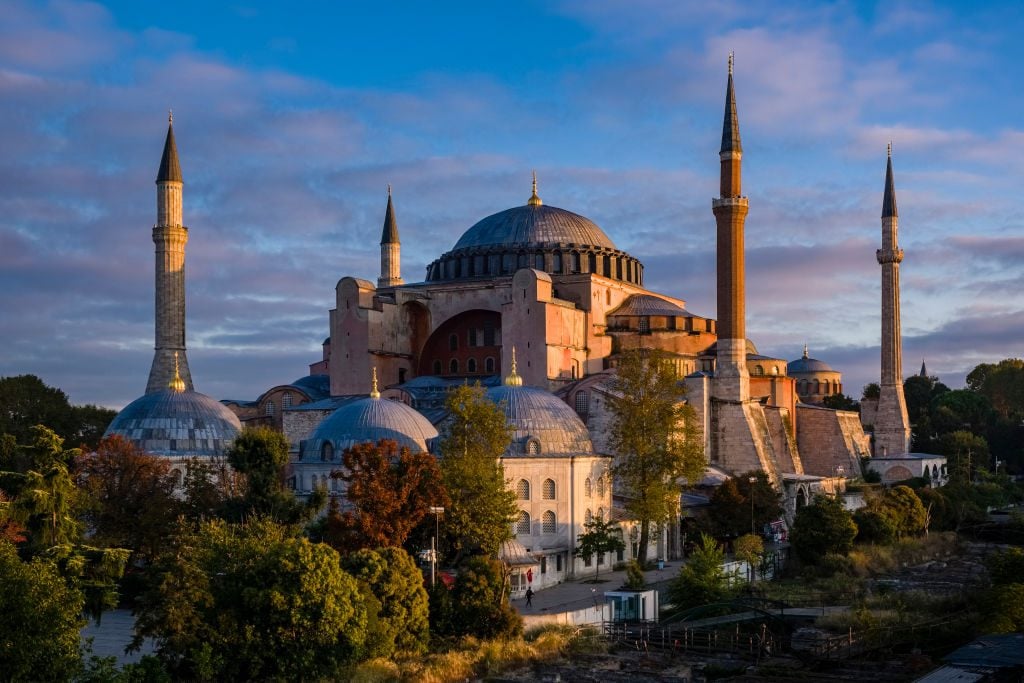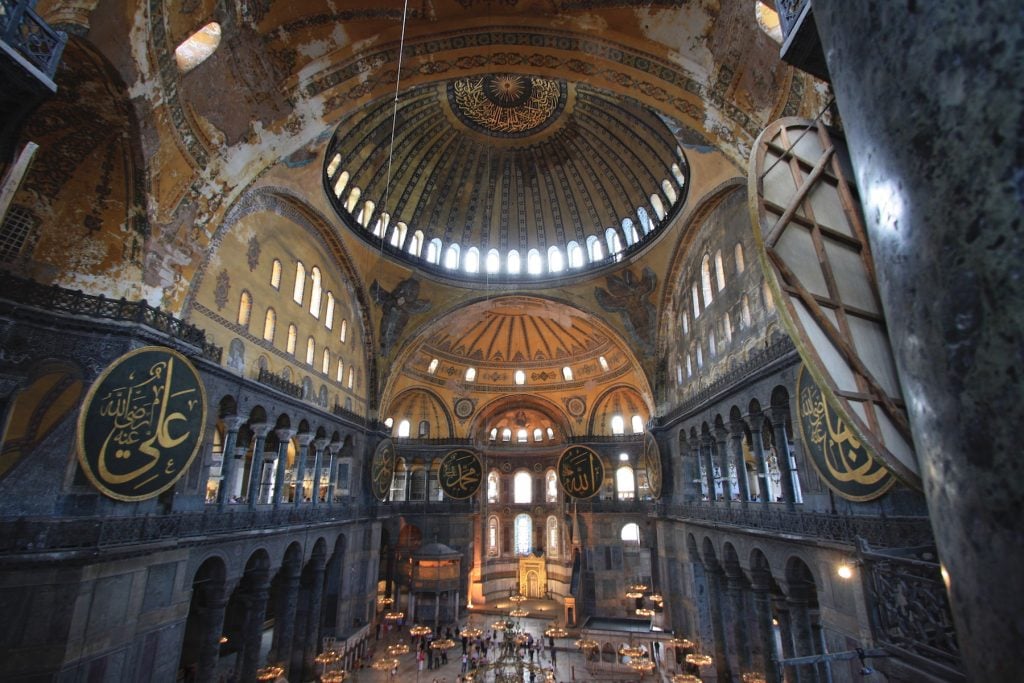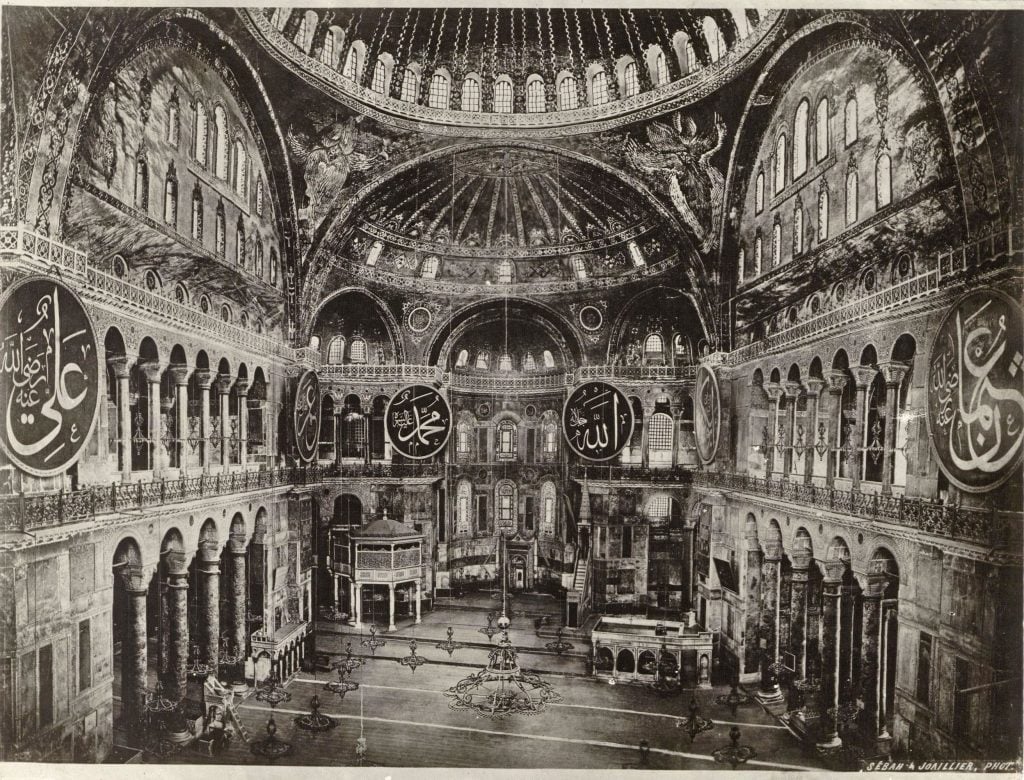Art World
A Turkish Court Has Revoked the Hagia Sophia’s Status as a Museum as the Country’s President Moves to Return It to a Functioning Mosque
UNESCO has expressed concerns about the change in status to the World Heritage Site.

UNESCO has expressed concerns about the change in status to the World Heritage Site.

Sarah Cascone

A Turkish court has revoked the famed Hagia Sophia’s status as a museum, paving the way for the sixth-century architectural wonder, known for its sparkling Byzantine mosaics and frescoes, to be reverted into a mosque.
President Recep Tayyip Erdoğan, who has been a vocal proponent of the change, wasted no time in capitalizing on the court ruling. Minutes later, he signed a decree ordering that the building be opened for Muslim prayer and transferring operations of the building from the Ministry of Culture to the state Religious Affairs Directorate.
“The opening of Hagia Sophia for worship does not prevent local or foreign tourists from visiting the place,” a presidential spokesperson told the state-run Anadolu Agency. Other popular historic sites, such as Notre Dame Cathedral in Paris and the Parthenon in Rome, are still in active use as Catholic churches.
The Hagia Sophia was Turkey’s most popular tourist attraction in 2019, attracting more than 3.7 million visitors. There have been legal challenges to its operation as a museum since 2005, with conservatives seeking its reversion to an active religious site. (Erdoğan has already converted three other Byzantine church museums into mosques.)

Interior of the Hagia Sophia. Photo by Sudharsan Narayanan, via Flickr.
A UNESCO World Heritage Site since 1985, the Hagia Sophia was built as a Greek Orthodox church in 537 AD, the largest one in the world at the time, and the seat of the Orthodox patriarch of Constantinople.
More than 900 years later, after the city fell to the Ottomans in 1453 and was rechristened Istanbul, the cathedral was converted into a mosque.
In today’s ruling, the court found that in conquering Istanbul, Ottoman ruler Sultan Mehmet II essentially established a foundation that owns the Hagia Sophia to this day. According to the court, that legal status cannot be changed, and the building’s use as a mosque cannot be alter.
After the establishment of the modern Republic of Turkey, the nation’s founding president, Mustafa Kemal Atatürk, declared the Hagia Sophia a museum in 1935. The historic site would be “open to the visits of all nations and religions,” according to his decree.
An Istanbul NGO had sought the annulment of that decision, with the support of Erdoğan.

An interior view of Istanbul’s Hagia Sophia in the 1930s. Photo by Sébah & Joaillier, SALT Research, Ali Saim Ülgen Archive
The case has surfaced historic tensions between both Greece and Turkey, and Christians and Muslims. Ahead of today’s decision, US Secretary of State Mike Pompeo joined Greece and Russia in calling for the building, seen as symbol of peaceful religious coexistence, to remain as a museum.
When the 1,500-year-old Hagia Sophia was a mosque, some of its Medieval mosaics and frescoes were plastered over, in deference to Islamic prohibitions against figuration in art. Critics fear those artworks will now once again be removed from view. How the building will change, and whether or not the government will continue charging admission, remains to be seen.
UNESCO has expressed concerns about the change to the World Heritage Site’s status.
“Hagia Sophia is an architectural masterpiece and a unique testimony to interactions between Europe and Asia over the centuries. Its status as a museum reflects the universal nature of its heritage, and makes it a powerful symbol for dialogue,” director-general Audrey Azoulay said in a statement.
The organization stressed that the government has an obligation not to modify the building without its approval, and called upon Turkish authorities “to engage in dialogue before taking any decision that might impact the universal value of the site.”